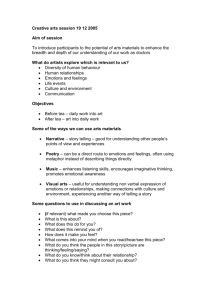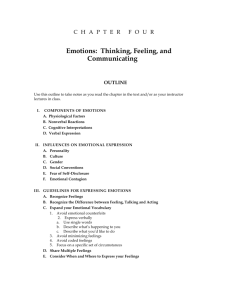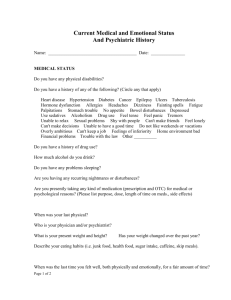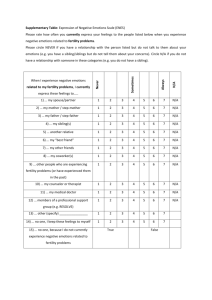Ch. 8 EMOTIONS
advertisement
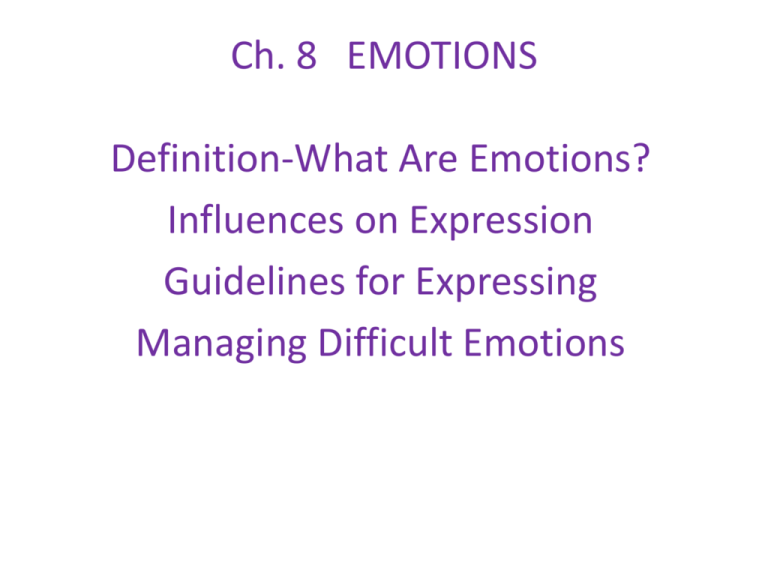
Ch. 8 EMOTIONS Definition-What Are Emotions? Influences on Expression Guidelines for Expressing Managing Difficult Emotions What Are Emotions? • 4 components: – Physical Changes-body changes you can feel • sweating, dizziness, churning stomach, etc. – Nonverbal Reactions - observed by others: Diff. in appearance, vocal tones, rate, etc.( • NV actions convey attitudes better than words) – Cognitive Interpretations-thinking abt. or labeling the physical symptoms • Your mind is important in determining how we feel. • Do you say , “I’m scared.” or “I’m a bit nervous.”? (shyness ex.) – Verbal Expression – We can’t always rely on our perceptions of a message, so we use words. • “Emotional intelligence- part is communicating clearly about feelings • Problems arise when you can’t talk CONSTRUCTIVELY abt. emotions • “Emotional coaching” of children (taught HOW to talk abt. their emotions) leads to more satisfying relationships when they’re older • “Emotional dismissing - NOT HEALTHY for children or adults Influences on Expressing Emotions 1. Personality- these traits are part biology b/c our brains amplify some of the emotional experience a. (more extroverted subjects showed more response to positive stimuli; neurotics responded more to negative stimuli. b. Personality isn’t all! Internet can be effective in making contact when personality is reticent. 2. Culture- (same events can generate diff. feelings in diff. cultures (fear of strangers, U.S.; relational communication in Japan) a. Display differences-warmer climates= more expressive b. Interpretation differences- Ethnicity shapes expression rules of YOUR OWN emotions. i. We need to understand our own “cultural filters” when judging others’ emotion-related behavior (COMMUN. COMPETENCE) ii. Individualism-collectivism spectrum greatly influences expression iii. With “out-groups”: Individualistic more likely to hide feelings from strangers; Collectivistic very frank abt. feelings about “out ups”. Emotion-Expression Influences (cont.) 3. Biological Sex & Gender- shape how we experience and express a. First factor=biological sex best predictor of ability to detect & interpret emotions a. First factor=biological sex best predictor of ability to detect & interpret emotions i. Women more physically attuned to emotions -They remember better individual stimuli on tests -Also remember arguments & men better at forgetting these -More intense reaction to emotional stimuli -More likely to both V and NV express feelings (wider range) II. Men less expressive face-to-face or on Internet if revealing vulnerability (sad, afraid) - Men express strengths and positive emotions. - Married men BECOME more able to express later in life. b. Second big variable= if the other person is same or diff. sex (but not all fit this profile) i. People better at recognizing emotions of same sex ii. Men more likely to express pos. emotions w/ women than with other men Emo. Expression Influences (cont.) Biological and Gender cont. c. Third factor = in close relationships- we tend to have and express more emotions I. More potential for feeling hurt or neglected if stronger romantic rela. compared to other relationships. d. Fourth factor=Power differences between the communicators ii. The less powerful good at reading & interpreting signals of more powerful 4. Social Conventions-unwritten rules, discourage direct emotional express. a. More comfortable making factual statements, opinions, but not emotions b. Share emotions-usually positive , but Social Con. limit too much of it c. Reluctant to embarrass or threaten the “face” of another. d. (Stearns & Stearns) Married couples think they share complimentary or face-saving feelings, but 3rd parties heard both positive & negative ones. e. Contemporary society discourages displaying anger. f. Husbands rarely said face-threatening or hostile feelings Emotional Influences cont. 5. 6. 7. Social Role Requirements: Many jobs limit how we “should” act. Religious leaders, teachers, CEOs, salespersons, etc. a. Ability to recognize & act on some emotions decreases w/o practice, so difficult to allow self to cry or feel appreciated/loved if not used to it. b. Makes accepting even positive emotions like love difficult Fear of Self-Disclosure: Risky if society discourages emotional expression a. Poss. unpleasant consequences: What if other doesn’t appreciate hearing feelings? b. Poss. misunderstandings: romance for friendship, uncertainty for weakness c. Might make others feel uncomfortable d. It might be used against you later. Emotional Contagion: transferring emotions from one person to another a. As if a “social virus”, emotions are contagious. (husbands & wives directly influence each other’s emotions) b. Can “catch” moods of others quickly & w/ or w/o verbal commun. if prolonged contact c. Less expressive persons moods resemble the more expressive person’s moods. Guidelines: Expressing Constructively Constructive expression improves health of self, of relationships, of career!!! 1. Recognize feelings-awareness & identification of emotions = part of “emotional intelligence” 2. Expand emotional vocab.-(Lang.ch.): be sincere, specific, & own the feeling! a. Avoid emotionally counterfeit statements: “I feel like doing something else.” = NOT a feeling. b. Avoid overly broad statements: “Great!” c. Don’t overqualify or downplay feelings: “I’m a little sad.” d. Add specific circumstances: “When you constantly interrupt me, I feel angry.” 3, Share multiple feelings - Important to share MIXED feelings a. We often only share the most negative one(s). b. Share positives ones also (ex..coming home late but not calling to let know) 4. Recognize the difference between Feeling and Acting a. Understand: We don’t have to act on feelings. Pretending you don’t feel doesn’t help Expressing Constructively cont. 5. 6. Accept Responsibility for Your Feelings! a. NO ONE MAKES YOU FEEL IT b. Use “I” language (ch. 5) Choose best Time and Place to Express Feelings- for BOTH of you a. Might be wise NOT to express feelings at times (police pull you over) b. Writing them has proven benefits: mental, physical, emotional Managing Difficult Emotions 1. Distinguish betwn. Facilitative & Debilitative Emotions-often degree of feeling a. Facilitative ones contribute to effective functioning b. Debilitative ones hinder or prevent effective functioning i. Commun. Apprehension (anxiety in new or difficult situations) can lead to problems- in personal, business, educational, even medical settings * Intensity (Can others tell? Does it matter? Job interview-yes) -*Duration (for both, or the one feeling- it may not the one aimed at 2. Thoughts cause feelings: rational-emotive approach -change thinking to change debilitative emotions a. Activating Event (Trigger) + Self-Talk (our thinking about it) = a consequence b. How we interpret the thinking (Self-Talk) determines feelings! i. Diff. interpretations= diff. feelings about the trigger (Activating Event) ii. Manage Self-Talk & you can manage your emotions better. Managing Difficult Emotions cont. 3. Irrational thinking creates Debilitative Emotions, so don’t accept negative Self-Talk (fallacies)! Examples are: a. Fallacy of Perfection: good communicators should be able to handle everything well & easily. i. Comes from thinking people won’t appreciate them if not perfect ii. Will try to appear perfect (wear social masks for acceptance) iii. Drawbacks: TAKES TOO MUCH ENERGY & EFFORT; if can tell, can be called a “phony”; lowers self-esteem (can’t meet own standards-just pretending) b. Fallacy of Approval: go to great lengths for approval, even sacrificing own needs or principles i. Implies some are more respected or liked b/c they please others (often not true) ii. Universal acceptance isn’t possible! Managing Irrational Thinking: Fallacies C. Fallacy of “Should”: Don’t distinguish betwn. what IS & what SHOULD BE, confusing “is” with “ought” i. World doesn’t operate as you desire just b/c you think it should ii. 3 consequences: - you are seldom happy or satisfied - keeps you from changing conditions - creates defensive climate in others (easier to be with non-preachers!) iii. “I wish ___ would ___, but I may be disappointed if I expect it to happen.” D. Fallacy of Overgeneralization: bases belief on inadequate evidence or exaggeration of shortcomings (“You never listen.”) E. Fallacy of Causation: belief you cause others’ feelings (fear to do/say anything to bother others) or others can cause feelings (blaming) i. Own your language! ii. Take responsibility for language & actions. No one makes you act; it’s a choice! Managing Irrational Thinking :Fallacies cont. F. Fallacy of Helplessness: forces beyond our control determine satisfaction in life VICTIM MENTALITY i. “Can’t” statements rationalize unwillingness to change. Instead, say “won’t” or “don’t know how”. ii. “Can’t” may become self-fulfilling prophesy b/c we act in ways to make undesirable results happen. iii. KNOW that you CAN act to change outcomes. (You can become a better communicator.) Managing Difficult Emotions 1. Monitor your Emotional Reactions: Increase awareness of debilitative emotions 2. Note the Activating Event (Trigger): Can be more than 1 person, type of person or setting, topic 3. Record Self-Talk : analyze thoughts linking trigger & feelings;(practice to get easier) 4. Dispute Irrational Beliefs: KEY TO SUCCESS! a. Decide if belief is rational or not b. Explain why not rational c. Create alternative, rational thinking This will reduce the number, intensity & duration of many emotional problems based on irrational thinking.
